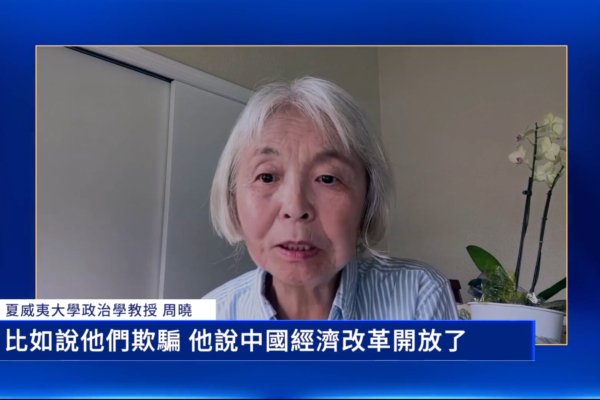The Chinese Communist Party has increasingly become the biggest threat to the democratic world. Over the past half century, how has the CCP successfully deceived Western democratic countries, and how has the democratic world, led by the United States, awakened? Dr. Zhou Xiaowei, a lifelong professor of political science at the University of Hawaii and a Ph.D. in political science from Princeton University, recently sat down for an interview with reporters.
Dr. Zhou first discussed how the CCP has misled Western democratic countries by delving into the history of the Chinese Communist Party. Initially, they used the international communist movement led by the Soviet Union to deceive Western democratic nations. However, after the famine in the Soviet Union in the 1930s, the West began to realize the problems with the Soviet regime. Nevertheless, the CCP continued to deceive idealistic leftists in the West through united front strategies, left-leaning media, and intellectuals.
According to Dr. Zhou, scholars like Raymond Aron in France have referred to Marxism as opium for intellectuals. The CCP has long collaborated with left-wing media and intellectuals in the West, compelling Chiang Kai-shek to terminate a series of anti-communist actions. Through figures like Anna Louise Strong and Agnes Smedley, who helped elevate Mao Zedong’s ideology, the CCP succeeded in glorifying itself while denigrating the Nationalist Party.
Dr. Zhou pointed out that Western intellectuals were sympathetic to Mao Zedong’s peasant revolution, which laid the foundation for the legitimacy of revolution and violence through the concept of private property. This utopian idealism led to a distorted perception of the CCP in the eyes of American elites even before the outbreak of the civil war in China.
Furthermore, Dr. Zhou highlighted the various tactics employed by the CCP in infiltrating Western media, universities, and intellectual circles. Through the dissemination of false narratives and the manipulation of information, the CCP managed to cultivate support among Western leftists, creating a narrative that painted the Nationalist Party as corrupt and chaotic, while portraying the CCP as champions of reducing rent, taxes, and interest, and promoting economic and social equality.
In recent years, the CCP has continued to deceive the Western world under the guise of “peaceful rise.” By utilizing slogans like “peaceful rise” to attract multinational corporations and conducting comprehensive penetrations in various sectors, particularly in the United States, the CCP has sought to interfere politically and create a conducive environment for its development in democratic countries.
The CCP’s long-term united front efforts involving various tactics like “blue, gold, and yellow” strategies have penetrated Western countries, influencing major media outlets, universities, and intellectuals through financial incentives and covert operations. The use of paid advertisements and propaganda in leading newspapers like The Wall Street Journal and The New York Times, as well as the manipulation of public opinion through various channels, have been key strategies employed by the CCP.
In addition to traditional forms of influence, the CCP has expanded its tactics by establishing initiatives like the Green-Gold Program, which exploits illegal organ harvesting to exert control over foreign officials and nations, empowering China with leverage on a global scale.
Following the Trump era, the United States adopted a tougher stance on China, leading to trade tensions and a continuation of policies under the Biden administration. The American consensus on countering the CCP has been shaped by events such as the 1989 Tiananmen Square massacre, where Western sanctions were imposed on the CCP, and the COVID-19 pandemic, which exposed the CCP’s lack of transparency and accountability, leading to global condemnation.
As Western nations increasingly recognize the true nature of the CCP’s actions, there has been a shift towards a more united front against the regime. The CCP’s disregard for democracy, human rights violations, and aggressive foreign policies have isolated China on the global stage, prompting widespread condemnation and a reevaluation of relations with the authoritarian regime.
In light of these revelations, the narratives propagated by the CCP have been exposed, leading to a growing awareness and resistance to the party’s deceptive practices both domestically and internationally. The awakening of the democratic world serves as a testament to the resilience and vigilance required to confront the threats posed by the CCP in the modern era.

